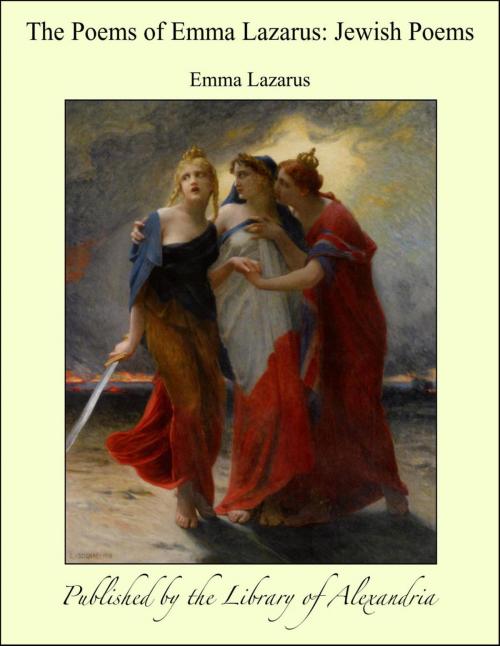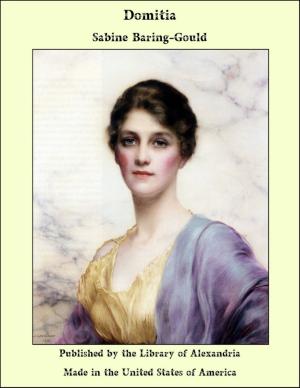The Poems of Emma Lazarus: Jewish Poems
Nonfiction, Religion & Spirituality, New Age, History, Fiction & Literature| Author: | Emma Lazarus | ISBN: | 9781465578617 |
| Publisher: | Library of Alexandria | Publication: | March 8, 2015 |
| Imprint: | Language: | English |
| Author: | Emma Lazarus |
| ISBN: | 9781465578617 |
| Publisher: | Library of Alexandria |
| Publication: | March 8, 2015 |
| Imprint: | |
| Language: | English |
One hesitates to lift the veil and throw the light upon a life so hidden and a personality so withdrawn as that of Emma Lazarus; but while her memory is fresh, and the echo of her songs still lingers in these pages, we feel it a duty to call up her presence once more, and to note the traits that made it remarkable and worthy to shine out clearly before the world. Of dramatic episode or climax in her life there is none; outwardly all was placid and serene, like an untroubled stream whose depths alone hold the strong, quick tide. The story of her life is the story of a mind, of a spirit, ever seeking, ever striving, and pressing onward and upward to new truth and light. Her works are the mirror of this progress. In reviewing them, the first point that strikes us is the precocity, or rather the spontaneity, of her poetic gift. She was a born singer; poetry was her natural language, and to write was less effort than to speak, for she was a shy, sensitive child, with strange reserves and reticences, not easily putting herself "en rapport" with those around her. Books were her world from her earliest years; in them she literally lost and found herself. She was eleven years old when the War of Succession broke out, which inspired her first lyric outbursts. Her poems and translations written between the ages of fourteen and seventeen were collected, and constituted her first published volume. Crude and immature as these productions naturally were, and utterly condemned by the writer's later judgment, they are, nevertheless, highly interesting and characteristic, giving, as they do, the keynote of much that afterwards unfolded itself in her life. One cannot fail to be rather painfully impressed by the profound melancholy pervading the book. The opening poem is "In Memoriam,"—on the death of a school friend and companion; and the two following poems also have death for theme. "On a Lock of my Mother's Hair" gives us reflections on growing old. These are the four poems written at the age of fourteen. There is not a wholly glad and joyous strain in the volume, and we might smile at the recurrence of broken vows, broken hearts, and broken lives in the experience of this maiden just entered upon her teens, were it not that the innocent child herself is in such deadly earnest. The two long narrative poems, "Bertha" and "Elfrida," are tragic in the extreme. Both are dashed off apparently at white heat: "Elfrida," over fifteen hundred lines of blank verse, in two weeks; "Bertha," in three and a half. We have said that Emma Lazarus was a born singer, but she did not sing, like a bird, for joy of being alive; and of being young, alas! there is no hint in these youthful effusions, except inasmuch as this unrelieved gloom, this ignorance of "values," so to speak, is a sign of youth, common especially among gifted persons of acute and premature sensibilities, whose imagination, not yet focused by reality, overreached the mark. With Emma Lazarus, however, this sombre streak has a deeper root; something of birth and temperament is in it—the stamp and heritage of a race born to suffer. But dominant and fundamental though it was, Hebraism was only latent thus far. It was classic and romantic art that first attracted and inspired her. She pictures Aphrodite the beautiful, arising from the waves, and the beautiful Apollo and his loves,—Daphne, pursued by the god, changing into the laurel, and the enamored Clytie into the faithful sunflower. Beauty, for its own sake, supreme and unconditional, charmed her primarily and to the end.
One hesitates to lift the veil and throw the light upon a life so hidden and a personality so withdrawn as that of Emma Lazarus; but while her memory is fresh, and the echo of her songs still lingers in these pages, we feel it a duty to call up her presence once more, and to note the traits that made it remarkable and worthy to shine out clearly before the world. Of dramatic episode or climax in her life there is none; outwardly all was placid and serene, like an untroubled stream whose depths alone hold the strong, quick tide. The story of her life is the story of a mind, of a spirit, ever seeking, ever striving, and pressing onward and upward to new truth and light. Her works are the mirror of this progress. In reviewing them, the first point that strikes us is the precocity, or rather the spontaneity, of her poetic gift. She was a born singer; poetry was her natural language, and to write was less effort than to speak, for she was a shy, sensitive child, with strange reserves and reticences, not easily putting herself "en rapport" with those around her. Books were her world from her earliest years; in them she literally lost and found herself. She was eleven years old when the War of Succession broke out, which inspired her first lyric outbursts. Her poems and translations written between the ages of fourteen and seventeen were collected, and constituted her first published volume. Crude and immature as these productions naturally were, and utterly condemned by the writer's later judgment, they are, nevertheless, highly interesting and characteristic, giving, as they do, the keynote of much that afterwards unfolded itself in her life. One cannot fail to be rather painfully impressed by the profound melancholy pervading the book. The opening poem is "In Memoriam,"—on the death of a school friend and companion; and the two following poems also have death for theme. "On a Lock of my Mother's Hair" gives us reflections on growing old. These are the four poems written at the age of fourteen. There is not a wholly glad and joyous strain in the volume, and we might smile at the recurrence of broken vows, broken hearts, and broken lives in the experience of this maiden just entered upon her teens, were it not that the innocent child herself is in such deadly earnest. The two long narrative poems, "Bertha" and "Elfrida," are tragic in the extreme. Both are dashed off apparently at white heat: "Elfrida," over fifteen hundred lines of blank verse, in two weeks; "Bertha," in three and a half. We have said that Emma Lazarus was a born singer, but she did not sing, like a bird, for joy of being alive; and of being young, alas! there is no hint in these youthful effusions, except inasmuch as this unrelieved gloom, this ignorance of "values," so to speak, is a sign of youth, common especially among gifted persons of acute and premature sensibilities, whose imagination, not yet focused by reality, overreached the mark. With Emma Lazarus, however, this sombre streak has a deeper root; something of birth and temperament is in it—the stamp and heritage of a race born to suffer. But dominant and fundamental though it was, Hebraism was only latent thus far. It was classic and romantic art that first attracted and inspired her. She pictures Aphrodite the beautiful, arising from the waves, and the beautiful Apollo and his loves,—Daphne, pursued by the god, changing into the laurel, and the enamored Clytie into the faithful sunflower. Beauty, for its own sake, supreme and unconditional, charmed her primarily and to the end.















